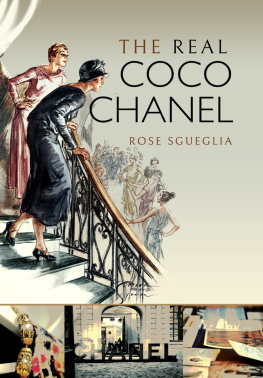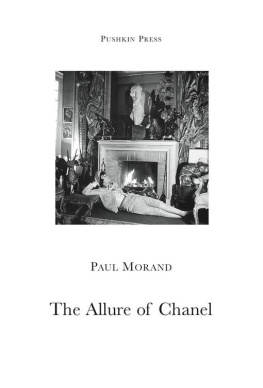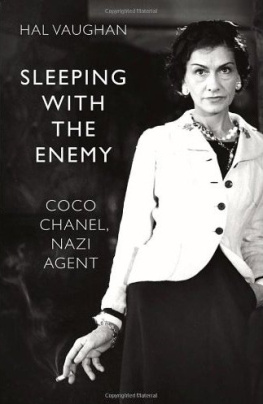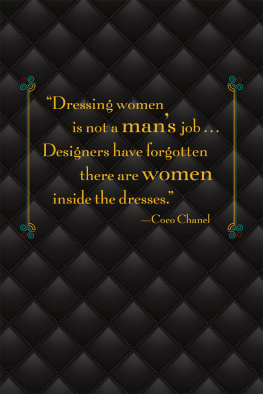Chanel
A Woman of Her Own
Axel Madsen
Ive a right to think, said Alice, for she was beginning to feel a little worried.
Just as much right, said the Duchess, as pigs have to fly.
Lewis Carroll
Contents
Acknowledgments
I could not thank all the people who took time to help me prepare this biographyand not all would want their names to appear. Let me thank at least:
In Paris and Cannes: Jacques Chazot, Thomas Quinn Curtis, Raymond Duparc, Alain LeGrignou, Leon Levine, Franois Mironnet, Sophie de Vilmorin, and, for an overview and sense of history, Yvonne Deslandres.
In Geneva, Zurich, and Munich: Jeanne-Marie Herter, Gjoko Ruzic, and Peter Gehrig.
In New York: Channa Taub, Horst, Alain Wertheimer, Suzanne Semilof, Debra Sherline, and the staff at Cond Nasts in-house library.
In Chicago and Los Angeles: Jane Jordan Browne, Margot Greenberg, and Michael Hargraves.
One
Chapter 1
A Family to Disavow
She made up things.
Gabrielle ChanelCoco to a few intimates and a hundred million womencame from nothing. She reinvented her childhood, describing nasty aunts who pulled her ears and humiliated her. After she became rich, she paid off her brothers to pretend they didnt exist.
She was the illegitimate daughter of itinerant market traders. Her mother died when she was twelve, her father disappeared, and she was brought up a charity ward in a nuns orphanage. Deep in her veins ran the fear of being discovered a bastard. Although her parents married shortly after she was born, she could never live with the truth and spent her adult years perpetually revising her life story. She went to her grave as Gabrielle Chasnel because to correct legally the misspelled name on her birth certificate would reveal that she was born in a poorhouse hospice.
Throughout her life she would make up an interesting, if not consistent, romance about her own existence with a good deal of color and detail. She made her wastrel father into a refined horse trader, denied she had brothers and sisters, and pretended not to remember people she had known intimately as well as benefactors and clients who had been the backbone of her early success. The fabricationspossibilities, really, in her own mindsustained her self-esteem, and she defended her stories with noble desperation. Her name came to mean emancipation and casual feminine allure, but when she became famous and everything was known about herher income, love affairs, tastes, successes, and sorrowsshe kept telling lies.
She spent a lifetime breaking with people who knew those odds and ends of her story that did not coincide with the legend she wanted to create. She distorted and exaggerated to her friends, to the reporters who interviewed her, and to the writers she asked to help prepare her memoirs. At one point in her life, Chanel engaged Louise de Vilmorin, the author of elegantly witty and mannered novels, to write her life story. However, when she read Vilmorins notes of their previous conversation, Coco exclaimed, But this is a novel!
When in old age a young woman suggested she see a psychiatrist, Chanel looked dismayedI, who never told the truth to my priest?
Her father was Albert Chanel, a twenty-seven-year-old trader in wine, bonnets, buttons, overalls, and kitchen aprons; her mother was nineteen-year-old Jeanne Devolle. Albert was not around that August 20, 1883, when Gabrielle was born in the poorhouse in Saumur, a garrison and market town on the Loire River. The birth was recorded the next afternoon. Two employees of the hospice went to city hall and declared a child of feminine gender had been born the previous afternoon at four, to Albert Chanel and Jeanne Devolle, a married couple. No papers were presented.
It was not the first time hospice employees had done this, and deputy mayor Franois Poitou dutifully wrote it all down in his big round handwriting. No one knew how to spell Chanel, so Poitou improvised and the family name was recorded with an s, Chasnel. The two hospice employees were illiterates. The last line of the registration said they had not signed the certificate because, in the standard phrase, they declare not to know how.
Gabrielle was not Jeanne Devolles first child. When Jeanne was seventeen, Albert had visited her native village of Courpire just long enough to father her first child, Julie.
Alberts family came from Ponteils, a village in the dark hills of the Cvennes, where, across from the church, they had been tavernkeepers from father to son since the mid-eighteenth century. The Chanel name appears often in the village records, since the tavernkeeper did witness duty at baptisms, weddings, and burials, strolling across the village square to scrawl the six letters of his name at the bottom of documents. Henri-Adrien, Alberts father, was the first of the Chanels to become a wayfaring peddler.
It is not known why Henri-Adrien did not become a tavernkeeper like his father before him, but we do know that at twenty-two he left Ponteils, unskilled and penniless, and after eight months of looking for work found a job as a laborer at a silkworm farm. The farmer had a sixteen-year-old daughter, Virginie Fournier. Henri-Adrien seduced her, and when her pregnancy could no longer be hidden, married her in the presence of his parents, who came down from the hills to stand by their boy. Once the couple had married, the Fourniers threw out their daughter and the author of her misfortune.
With his child bride, Henri-Adrien took to the road, to become a fairground and marketplace hawker. Albert was born in Nmes, at the poorhouse hospice, in 1856. His father was traveling. Three hospital employees registered the infants birth. The family name was written Charnet.
Henri-Adrien returned to Nmes just long enough to pick up his wife and newborn son before he and his family set off on the road again. Alberts siblings, like Albert himself, were born wherever the family happened to be laying over, always at the public hospital. As the years passed, Henri-Adrien and Virginie continued on the road but took to spending the winters in Clermont-Ferrand, the bustling capital of the ancient province of Auvergne.
Like his father, Albert left home and took to the road; in 1881 he stopped off in the village of Courpire. He rented a room from Marin Devolle and, perhaps to impress his landlord about his intention to stay, went to the town hall and had himself put on the electoral list.
As family lore had it, Albert could charm the birds from the trees. He knew how to prattle with village girls, and he cast his spell over them allespecially his landlords sister, Jeanne Devolle. She and Marin had lost their mother when they were children, their father when they were in their teens. Though Marin and Jeanne Devolle were orphans, they were far from destitute. Marin had inherited his fathers carpenter shop; Jeanne was going to be a seamstress like her mother. One night Albert arranged a rendezvous with her. In January 1882, he vanished, leaving Jeanne pregnant.
Eventually, Marin tracked down Alberts family in Clermont-Ferrand, and from them learned that Albert was in a town called Aubenas. Nine months pregnant, Jeanne set out alone for Aubenas, almost two hundred kilometers down the Allier Valley and across the Cvennes. She found Albert in the local tavern. He had a room at the tavern and transacted his business there. There, Julie was born on September 11, 1882. Business was bad, Albert told Jeanne. At her insistence, he agreed to recognize the child but refused to get married. Yet he must have consented to pretend they were married, for Julie Chanel was declared the child of a wedded couple.














